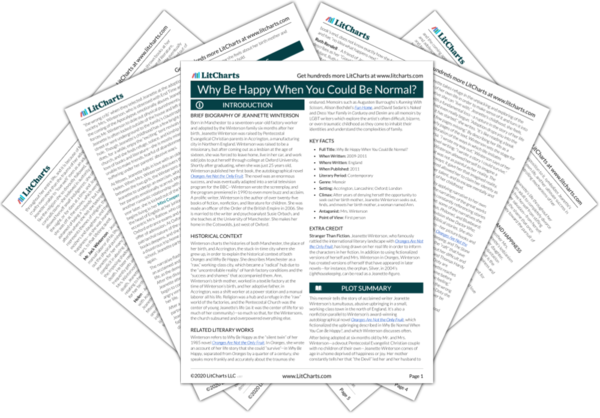This memoir tells the story of acclaimed writer Jeanette Winterson’s tumultuous, abusive upbringing in a small, working-class town in the north of England. It’s also a nonfiction parallel to Winterson’s award-winning autobiographical novel Oranges Are Not the Only Fruit, which fictionalized the upbringing described in Why Be Normal When You Can Be Happy?, and which Winterson discusses often.
After being adopted at six months old by Mr. and Mrs. Winterson—a devout Pentecostal Evangelist Christian couple with no children of their own—Jeanette Winterson comes of age in a home deprived of happiness or joy. Her mother constantly tells her that “the Devil” led her and her husband to “the wrong crib” when they selected Jeanette at the adoption society. Mrs. Winterson, who is obsessed with End Time and the coming of the Apocalypse, emotionally abuses Jeanette and forces Mr. Winterson to dole out physical punishments. Jeanette is often locked outside of the house and left on the street or sent underground to the family’s claustrophobic coal-hole. Though Jeanette’s childhood has a few bright spots—she does, for a while, enjoy the “exciting” tent revivals of her family’s church, and she finds refuge, solace, and kinship in her intense love of books and literature—she is mostly miserable. She’s unable to make friends, fearful of abandonment, and constantly suffering under her parents’ abusive ways.

At fifteen, Jeanette falls in love with an older girl from church, Helen. When Mrs. Winterson discovers the relationship between the two girls, the Wintersons and their church force Jeanette to undergo an exorcism, which leaves both her and her parents emotionally scarred. When Jeanette pursues another romantic relationship with a classmate named Janey a year later, she is kicked out of the Winterson household and begins living in her Mini Cooper. She is taken in, eventually, by the head of English at her junior college, the kindly and eccentric Mrs. Ratlow, who coaches Jeanette through her Oxford entrance exams and eventually helps her to secure an offer of admission. At Oxford, Jeanette is frustrated by the patriarchal nature of the university, but her love of reading and books deepens, and she feels the world opening up to her. After a disastrous trip home at Christmastime after her first term at school, Jeanette parts ways with her mother, never to see her again.
The narrative flashes forward to the year 2007—Jeanette, now an acclaimed and world-renowned writer, is struggling in her life, as the demons of her past have finally caught up with her. After the dissolution of a tumultuous romantic relationship, Jeanette attempts suicide—she fails, and realizes that she must begin to confront the “creature” within her, the scarred and angry version of her younger self, who has threatened her all her life.
After a period of healing, Jeanette, with the help of her new partner Susie, embarks on a journey to find her birth mother. Jeanette has found her birth certificate while cleaning out her father’s home after the death of his second wife, and the discovery has sparked new questions about her heritage. Jeanette, Susie, and Jeanette’s social worker Ria encounter a series of brick walls and red tape as they negotiate the distant and unhelpful government agencies which keep the truth of Jeanette’s past and the identity of her birth parents just out of reach. Eventually, through a combination of sheer will and intrepid detective work, Jeanette discovers the identity of her birth mother—a woman named Ann S. who lives outside of Manchester—and reconnects with her.
The book ends with Jeanette having found some measure of peace in her reconnecting with Ann, though she is still uncertain of both how she feels about her birth mother and what her own future might hold.







